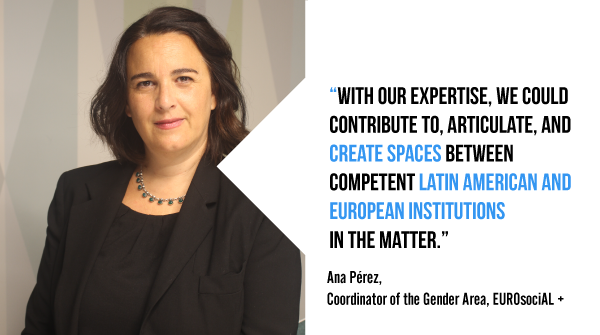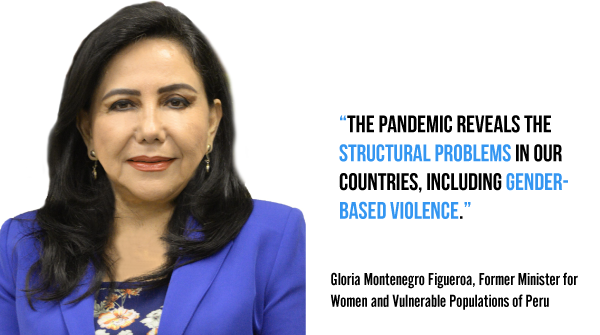.linkfrench, .linkfrench:visited{ color: white; text-decoration: underline; }
Este artículo también está disponible en Español.
During the COVID-19 pandemic, the need to share expertise on gender-based violence in the current context of social isolation has become apparent. Governmental institutions in Latin America and Europe reached out to the EUROsociAL+ programme which responded by organising a series of three webinars.
Comparable data on gender-based violence during the pandemic in Latin America is unavailable at the moment. Nevertheless, violence against women and girls is all too common in the region with the highest rates of femicide in the world. According to the Economic Commission for Latin America and the Caribbean (ECLAC), in 2019 the number of femicides exceeded 3,800.

The magnitude of the increase in such violence is not clear. Given its potential rise during the pandemic, it was deemed crucial to take action. EUROsociAL+ webinars identified common challenges and proposed solutions in three areas: emergency care, penalties and prevention.
Emergency care
The first webinar was dedicated to the response to gender-based violence in the context of COVID-19 in Latin America. The objective was to create spaces for dialogue and to reinforce rapid collaboration networks between the different parties involved, being governments or other organisations.
Gloria Montenegro Figueroa, Minister for Women and Vulnerable Populations and former congresswoman in Peru, explained that through Legislative Decree 1470, measures to guarantee the care and protection of victims of violence during the pandemic were established. Importantly, the use of a short messaging system through mobile phones enables authorities to communicate about services for care and protection of victims of violence.
In France, an agreement on Shelter and Access to Housing for Victims of Domestic Violence was finalised. Maïté Albagly, former coordinator of the French 3919-telephone line (1) and member of the French National Federation for Women’s Solidarity (FNSF), also explained that almost 40% of the calls to this number were made by family and friends of assaulted women and girls, which is a new trend.
The Argentinian contingency plan was presented by Josefina Kelly, Secretary for Policies Against Gender Violence of the Ministry of Women, Gender and Diversity in Argentina. A joint protocol with the Argentina Pharmaceutical Confederation (COFA), called "Barbijo Rojo"(2) supports women and LGTBQ victims of gender-based violence who cannot ask for help through any other means.

Penalties
A second online event aimed at discussing how justice officials have adapted to the crisis, and what challenges and opportunities exist for them after the lockdown.
It also addressed the issue of complaints, orders, and protective measures, and discussed whether they rose or fell during the lockdown, and how femicides that occurred in social isolation have been treated and punished.
In Guatemala, the Public Prosecutor's Office can now launch mechanisms for reporting violence through telephone lines, WhatsApp, mail and others. This is considered as a major improvement.
"Today more than ever we need to provide prompt, efficient and humane care to the victims, so our responses must be creative, immediate and inter-institutional", explains Dr María Consuelo Porras Argueta, Attorney General and Head of the Public Ministry of Guatemala.
In Argentina, a guide containing urgent measures for prosecutors in cases of gender-based violence during the isolation period of the pandemic has been developed. It includes essential procedures in the current emergency situation (3).
Prevention
The third webinar focused on the deterrence of aggressors through the deconstruction of dominant masculinities and prevention campaigns with men and women through different channels such as the private sector, the media and schools.

In Mexico, online sessions have been made available to guarantee the re-education of aggressors. EUROsociAL+ is also collaborating to improve the national emergency number 911 helpline.
In Bogotá, Colombia, through the New Masculinities programme(4) micro-talks, WhatsApp video calls have been organised with families at high risk of different forms of violence.
These three webinars have contributed to providing a space for debate on gender-based violence during the COVID-19 health crisis, and to searching for solutions to further protect women and girls.
|
ABOUT EUROsociAL+ EUROsociAL+ is a cooperation programme between the European Union and Latin America. It contributes to the reduction of inequalities, the improvement of social cohesion levels, and the strengthening of institutions in 19 Latin American countries. It supports their processes of design, reform, and the implementation of public policies; focusing its action on the issues of gender equality, democratic governance and social policies. EUROsociaAL+ area of gender policies has structured the fight against gender gaps in three ways - physical, economic and political - and the mainstreaming of the gender perspective. Physical autonomy, especially its focus on the fight against gender violence, is considered by the programme as the most important to support. |
Click on the play button below to watch our video about the work of EUROsociAL+ to fight gender-based violence in Latin America during COVID-19.
This article was written by María Edith López Hernández, EUROsociAL+ Gender Expert, and Jackeline Rojas, Senior Project Manager EUROSocial+ gender area, with the support of the Capacity4dev editorial team.
Credit: Videos © Capacity4dev | Photo © Dollar Gill on Unsplash
(1) National telephone line protecting victims of domestic violence with 25 years of operation. Although not operated by the government, a large part of its funding comes from the government. It connects 67 associations throughout the country with the capacity to accommodate 2,800 women and children through shelters.
(2) Barbijo Rojo Programme: a humanitarian service located in pharmacies.
(3) "Urgent measures suggested to prosecutors for cases of gender-based violence during the preventive and obligatory isolation provided for in the wake of the COVID-19 pandemic”.
(4)The programme seeks to reduce cultural and institutional acceptance of machismo and violence against women, thus ensuring effective access to justice.





Log in with your EU Login account to post or comment on the platform.